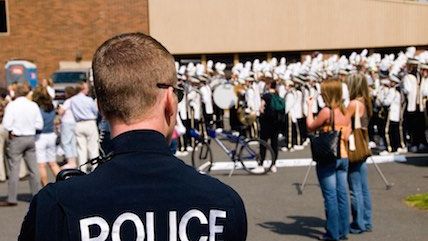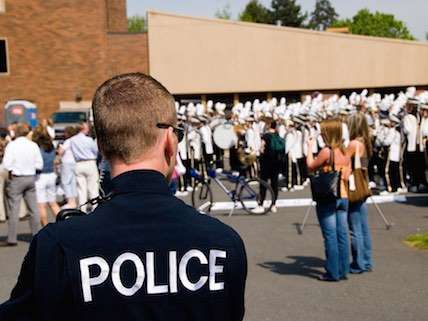Too Many Cops, Not Enough Counselors: Why Public Schools Are Such a Disaster
New data from the Education Department underscores the problem.


There are 1.6 million young people attending a public school that employs a police officer but no guidance counselor, according to new data released by the Education Department.
That's just one of the noteworthy findings from the data, which was collected by the Office for Civil Rights and represents all 95,000 public schools in the country.
The data also revealed just how ubiquitous police have become in American K-12 education. Cops are present in a quarter of public elementary schools and 42 percent of high schools. They are overrepresented in schools with significant numbers of black and Latino students, and these students are much more likely to be referred to law enforcement because of school disciplinary infractions. Black students, in fact, are 2.3 times more likely than white students to be arrested because of a school dispute.
Historically speaking, cops in schools is a relatively new phenomenon. There were virtually no police officers assigned to patrol the halls of elementary and high schools prior to the 1970s. Today, of course, there are thousands of them.
This matters a great deal. When there's no cop in the school, the school is more likely to deal with a disobedient student internally. In most cases—serious violence being an obvious exception—schools should handle badly behaved kids on their own. That's the entire purpose of public K-12 education: to socialize young people and correct misbehavior. Schools should be teaching kids to do the right thing, not locking them up for failing to be perfect adults.
But when cops roam the schools, the schools are far more likely to get the criminal justice system involved. According to one study, the presence of a school resource officer makes law enforcement becoming involved in a behavioral issue about 1.6 times more likely. Having a run-in with law enforcement is a solid indicator that a kid will not graduate, and will have additional legal troubles later in life.
The new Education Department data is a good reminder that one of the best things we could do for young people enrolled in the public education system would be to disentangle law enforcement from mundane disciplinary matters. With rare exception, cops do not belong in schools.


Show Comments (75)